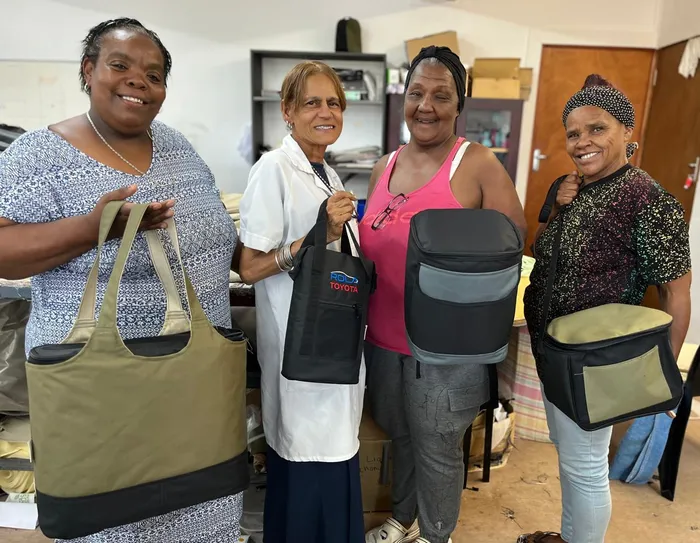Sewing second chances for Pollsmoor ex-offenders

Hands of Hope is making a difference in the lives of ex-offenders by providing training and skillful employment. Some of the team show off their handmade items, from left Alison Davids, a cut, make and trimmer; Naomi Benjamin, a supervisor, and non-offender who brings her textile industry experience; Galiema Albertyn, a seamstress and Elmarie Farber, a cutter.
Image: Janice Matthews
Hands of Hope is a development project aimed at breaking the cycle of crime by providing ex-offenders with skills training and employment opportunities after their release from Pollsmoor Prison.
The project was founded in 2012 by Hansie Elcock, who volunteered to teach women how to make banners. However, she soon recognised the greater need for sustainable, skills-based employment to help reduce recidivism.
Hands of Hope operates under Hope Prison Ministry, an internationally recognised NGO founded by Jonathan and Jenny Clayton 25 years ago.
The ministry has a 22-year track record of working with Pollsmoor Prison, supporting incarcerated people, their communities, and the Department of Correctional Services – one of its goals is recidivism reduction.
According to Dr Casper Lӧtter, a conflict criminologist affiliated with North-West University’s School of Philosophy, South Africa has a very high recidivism rate, estimated to be between 86% and 94%.
The Hands of Hope project, aimed at breaking that re-offending cycle, currently has a team of six, including a supervisor, seamstresses, cut, make, and trimmers (CMT), who make clothes, accessories, gifts, and bags.
Alison Davids says she’s not sure where she’d be without the project, but having steady employment and the ability to earn an honest living has transformed her life.
Ms Davids of Lavender Hill has been with the project since 2012. She spent 30 days in prison for shoplifting to feed her drug addiction. She now works as a CMT.
“We started off with these small, domestic sewing machines, and then the project grew. We used to make handbags first, and every now and then, Hansie would bring a new bag, we would take apart to figure out how it was made. We then made picnic bags and two-pocket wine coolers. We’ve been making these for years now.”
Speaking volumes on the quality of their fabric and the power of the stitch, Ms. Davids recalls how one of the seamstresses, Galiema, became seriously ill one day.
She suffered a seizure at work, leaving her unable to walk. With no wheelchair available, Pastor Clayton came up with the idea to carry her using one of their handmade bags. Using the sturdy handles, they lifted her - one person on each side - and carried her from the training center to the parking lot.
Galiema Albertyn, of Manenberg, has faced many "calamities" in her life.
At 23, the mother of two was convicted of murdering her first and only boyfriend following the discovery of his infidelity with her best friend.
“I was four months pregnant with my second child, and when I got home, I caught them together, and I totally lost it. I was arrested, and the state decided it was premeditated murder. They said I could’ve turned around, done nothing about it, or reported it.”
Some 17 years later, Ms Albertyn was released just after her 41st birthday.
"I started working with sewing machines in the textile industry. I had learned a lot of those skills while I was in the women’s prison, which prepared me to do this work now."
“When you are released they give you work papers, with the prison stamp on it. I went to quite a few Cut, Make, Trim manufacturers.”
Being good at what she does, Ms Albertyn, would find employment as a seamstress, but she had trouble keeping it.
“Somehow it always gets to people’s ears that I was in prison. I would be called to the office and asked what I went in for. I asked myself 'what do I do now?' Eventually, they’d say, we're going to let you know when you must come again. And it happened like that every time.”
Due to the stigma, Ms Albertyn thought she’d be better off back in prison. However, through Hands of Hope, she has found a sense of belonging and purpose again.
“My family totally wrote me off. Honestly, Hands of Hope became my family. We have our ups and downs. But at the end of the day, when the work must go out, we work together as a team, irrespective of our differences.”
For more information about Hands of Hope, visit its website, www.handsofhope.capetown, or email hope@handsofhope.capetown
Related Topics: